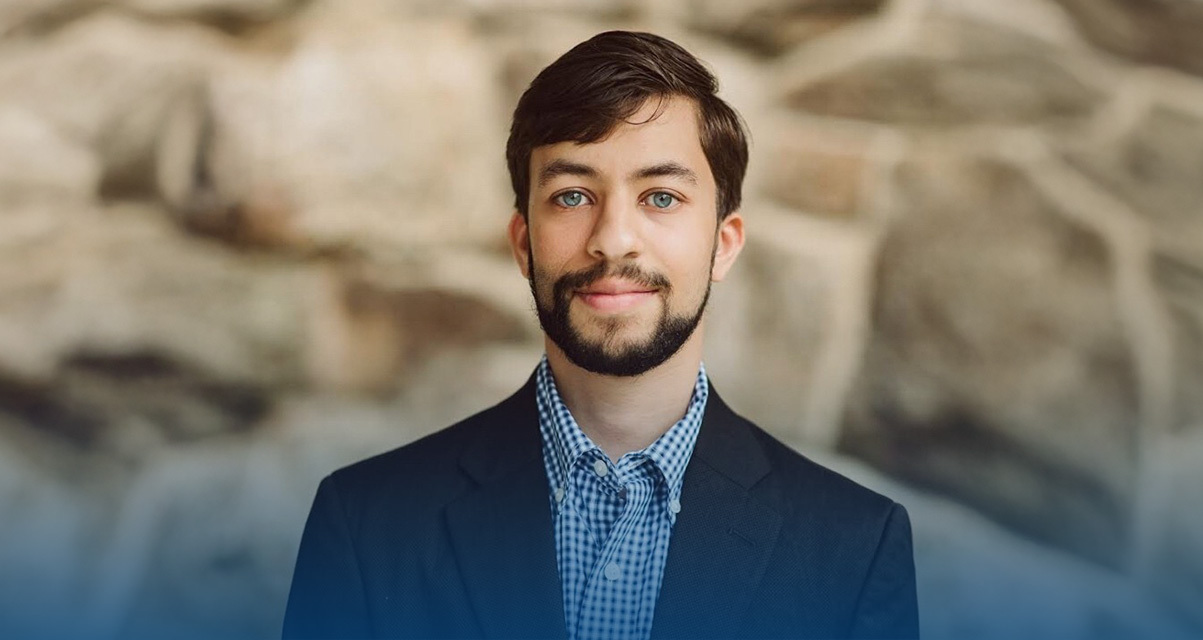Matthew Ravichandran ’23 Wins ASA Early Career Scientist Award for Bridging Faith and Science
Matthew Ravichandran ’23 (biology and pre-med) was the American Scientific Affiliation (ASA) 2024 Early Career Scientist Award recipient. He is currently a research technician in the Puigserver Lab at the Dana-Farber Institute (Boston, MA), studying the interplay of mitochondria and cancer, mitochondrial protein import systems, cytosolic chaperone proteins and metabolic diseases. We sat down with him to ask about the award and his approach to bridging science and faith.
What is the ASA? How did you get involved with them?
The ASA is a group of Christians in the sciences whose mission is to “interpret, integrate, and communicate the discoveries of science with insights of Scripture and Christian theology.”
When I was a sophomore at Gordon, I took a class with Dr. Dorothy Boorse, an ASA fellow, called Biological Science and Faith, where we discussed how religion and science coexist in the Christian faith, especially in evolution and different creation theories. It really opened my eyes and made me think critically about how my faith and my aspirations to be a scientist could connect.
One of the class assignments brought me into contact with the ASA, and I resonated with their mission, so I joined the campus chapter. I was particularly impacted by our roundtable dinners, where we invited a Christian in the sciences (of note were Henry “Fritz” Schaeffer and Keith Miller) to come give their perspective on a particular topic and how it related to their faith.
How did you win the ASA award?
Every year the ASA gives this award to someone they think emulates the spirit of the organization. I was selected for the 2024 award because of a documentary I worked on with the ASA student chapter, videographers from Weymouth Griffin Design and faculty mentor Dr. Angie Cornwell. To further promote dialogue on campus and in the greater community around us, the Gordon College student chapter (though a Scholarship and Christianity in Oxford funding grant) developed a documentary exploring students’ beliefs on science and faith.
I am very proud of the group for what we were able to accomplish; currently the working title of our documentary is Origins: Science and Faith. There is still some work to be done, and I hope that we will get the opportunity to share the documentary in the coming months.
What kind of research are you working on for the Dana Farber Institute?
Broadly speaking the lab I am a part of studies the mechanisms regulating metabolic and energetic processes, which are the main jobs of mitochondria as an organelle. We also look at mitochondria’s role in several diseases, including cancers, metabolic diseases and even some rare diseases. The project I work on is centered around understanding how the mitochondrial protein import system is regulated under high-fat-diet-induced stress. We found that cytosolic chaperone proteins, which are responsible for ensuring proteins fold correctly, are activated by high-fat induced stress and help sustain the protein import system by inserting the transport proteins into the membrane.
What does an average day look like at your job?
The type of research I do is called basic research, where we seek to understand the mechanism behind a process. Specifically, I do a lot of wet lab research, so I am at the bench most of the time.
One of my favorite techniques that I have learned and perform at my job is called immobilized metal affinity chromatography (IMAC) protein purification. It is a purification method that separates proteins based on their ability to bind to metal ions. First, a mixture of proteins is loaded into the column, and proteins with what’s called a His-tag will bind to the metal-based resin. Then, using various buffers, unwanted proteins that haven’t bound to the column are washed away. Then another buffer, which contains a compound called imidazole, is added that allows the bound proteins to be removed, and I can then quantify the amount and check the purity of the protein.
How did Gordon prepare you for the role you have now?
Aside from introducing me to the ASA, Gordon’s biology faculty, including Dr. Angie Cornwell and Dr. Craig Story, taught me a lot of advanced biochemical and molecular biology techniques that played a huge role in me getting my job. They also pushed me to think about how my faith would integrate with my career.
In one of my classes, I read the book The Language of God: A Scientist Presents Evidence for Belief by Francis Collins, former director of the National Institutes of Health, an ASA fellow and a faithful Christian. His book was about how religion and science are compatible, and as a Christian, there isn’t anything to be afraid of when studying it. I’ve carried that with me ever since.
 The Bell
The Bell